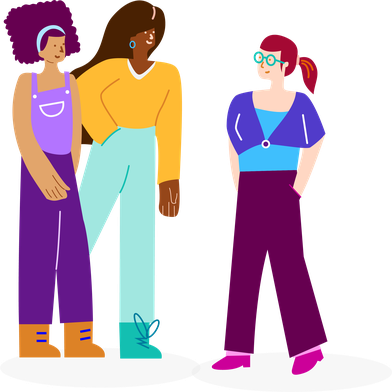Women's Homelessness - What's the difference?
Women experience homelessness in different ways to men. Triggers of homelessness as well as experiences while homeless are unique to each person, however a person's gender and relationship to their gender impacts on their experience. To consider the impact of gender is to adopt a 'gender informed' approach.
Women are less likely to be visibly homeless, for a variety of reasons, a significant reason being the need to manage their own safety. Women are more likely to experience homelessness between temporary accommodation, other precarious forms of accommodation and rough sleeping. Women are also less easily categorised as single and homeless, their relationship to motherhood affecting their experience of being homeless.
Exploring women's homelessness
Women are often less visible while homelessness and so evidence of their experiences can be harder to find. To understand more about women's experiences of homelessness it can be important to explore and uncover national and local evidence. Evidence includes quantitative data, for example, service data on referrals. It also includes qualitative data, for example, the information that women with lived experience might share with the service. Start exploring women's experiences of homelessness by reading the following pages.
-
Myth Busting Women’s Homelessness
Myths or assumptions about women’s experience impact on most aspects of homelessness, from who is represented in the data, how services are commissioned and designed, and how the public treat women who are visibly homeless.
-
Exploring Women's Homelessness - what we know
A literature review on women's homelessness.
How can services improve their support for women?
Homelessness services can improve the support they provide to women's by becoming 'gender informed'. This means that the service understands the impact of gender on a persons experience and adapts the service to reflect this understanding. For example, if the service understands that women are more likely to be hidden while homeless, then the service might avoid strict access criteria which relies on a women being seen while homeless.
Homeless Link have produced the 'Gendered Lens Framework' to support homelessness services to improve their response to women. The Gendered Lens Framework communicates what we have learned from Homeless Link's research into adapting a gender informed approach to improve outcomes for women. This includes the report 'Promising Practice from the Frontline' (2019) and the 'Insights and Impact report' (2021).
The Gendered Lens Framework was also developed with women with lived experience and practitioners in the women's and homelessness sector. Read the workbook which introduces the framework to understand more about women's experiences of homelessness and how to adopt a gender informed response to women.
It contains:
Practical steps services can take to respond to women
Art produced by women with lived experience
Case studies
Practice templates
You can also watch the bitesize video series on how to adopt the Gendered Lens Framework.
-
Influencing for change (Women’s Homelessness)
This briefing provides ‘Top Tips from the Frontline’ on influencing for change in the response of systems and services to women’s homelessness.
-
The Gendered Lens Framework for Homelessness Services
The Gendered Lens Framework includes seven approaches for embedding gender-informed practice into homelessness services. Its a workbook with top tips, case studies and original artwork to support services to become more inclusive.
-
Gendered Lens Framework - Bitesize Learning
To accompany the gendered lens guide, Homeless Link have produced a series of short (5-10min) videos to help services look at each different lens.
-
Promising practice from the frontline
Exploring gendered approaches to supporting women experiencing homelessness and multiple disadvantage
-
Insights and Impact from the Ending Women’s Homelessness Fund
The Ending Women’s Homelessness Fund (EWHF) was established by Homeless Link to fund grantees to develop new initiatives or enhance their existing work to improve support for women experiencing homelessness and multiple disadvantage.
All Women are Different
Women are not a homogenous group and it important to recognise how the experience of women of color, trans women, queer and disabled women among many others may be different from each other. In order to provide effective support to women, it is important to explore how their lives are impacted by forms of structural violence which shape their experiences of homelessness and their relationship to services.
Have a look at Homeless Link's other areas of expertise in diverse needs and consider how they intersect with gendered experiences of homelessness.
-
Supporting Migrant Women
This briefing provides ‘Top Tips from the Frontline’ on how to support migrant women.
-
Supporting LGBTQI+ Women Experiencing Homelessness
This webinar is delivered by Homeless Link alongside colleagues that work in specialist services for the LGBTQI+ people experiencing homeless. Watch the recording to learn more about the experiences of, and best practice in supporting women who identify as LGBTQI+ .
-
Supporting young women: learning from the sector
The following presentations were delivered in December 2020 at the Homeless Link young Women’s Network Event, drawing learning from our youth and women’s homelessness work.
-
NRPF, homelessness and women and families
This workshop will hear from leading organisations in support for women, children and families subject to immigration control and explore the different routes open to support and help with accommodation and the prevention of homelessness.
-
Supporting Women Involved In Sex Work And Survival Sex
This webinar will explore what specialist frontline services are doing to support women involved in sex work and survival sex and consider the key issues women are facing during COVID-19 and beyond.
Responding to Domestic Abuse
Domestic abuse is a primary trigger of homelessness amongst women, and continues to impact the experiences of women while homeless. Experiences of violence are 'near universal' among women rough sleeping. All services, statutory and non-statutory, have a role to play in preventing and responding to domestic abuse.
Supporting women while they are in a relationship, particularly when you might consider it an unhealthy relationship can be a really complex task. Homeless Link have supported the development of guidance on working effectively with survivors and perpetrators of domestic abuse in homelessness settings. Explore this guidance on supporting couples to understand how to effectively respond to perpetrators of domestic abuse.
-
Advocating for Women
This briefing provides ‘Top Tips from the Frontline’ on how to advocate effectively for women.
-
London PLUS: The Domestic Abuse Act May 2021
Collected resources and presentations from Online Event: The Domestic Abuse Act May 2021.
-
Supporting older women experiencing domestic abuse and at risk of homelessness
Hear from two of our Ending Women's Homelessness Grantees Safer Places in Essex and Staffordshire Women's Aid in Stafford on the support they provide to older women experiencing domestic abuse and at risk of homelessness.
-
How can local authorities help prevent domestic abuse?
Domestic abuse is a primary trigger of homelessness among women and providing an effective response should be a key priority for local authorities across England.
-
Supporting Couples
How can homelessness accommodation and support services work positively with couples? Read our guidance on Universal Credit and Housing Benefit claims for couples.
Developing a Gender-informed Service : External guidance and toolkits
Toolkit: Setting up a Women's Space in Homelessness Setting
This toolkit was produced by the Women's Development Unit to support mixed-gender homelessness services to establish effective support for women.
The Women's Development Unit (WDU) was a joint project between The Connection at St Martin’s and Solace Women’s Aid (Solace).
Find out moreGuidance: Supporting Homeless Women Experiencing Multiple Disadvantage
This guidance has been designed to support frontline practitioners and services to understand and respond to the needs of women experiencing multiple disadvantage.
It was produced for ‘Safety by Experience’, a joint project between St Mungo’s, Standing Together Against Domestic Abuse and funded by Homeless Link’s Ending Women’s Homelessness Fund.
Find out moreToolkit: Addressing Domestic and Sexual Violence, Substance Use and Mental Ill-health
This toolkit is produced by AVA and is designed to raise awareness of how domestic and sexual violence, problematic substance use and mental ill-health often co-exist. It details effective ways to engage with individuals and families who are affected by these issues.
Find out moreToolkit: Homeless Pregnancy
This toolkit is developed by St Mungo's and sets out to how to empower pregnant homeless women to have a degree of choice and decision making over their pregnancy.
Find out moreToolkit: Whole Housing Approach
This toolkit was produced by the Domestic Abuse Housing Alliance (DAHA) as a practical guide for local areas on how to implement the While Housing Approach (WHA). The Whole Housing Approach is a framework to help people experiencing domestic abuse to either maintain or access safe and stable housing.
Find out more
